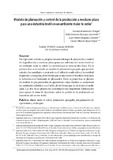Modelo de planeación y control de la producción a mediano plazo para una industria textil en un ambiente make to order
Planning and production control in the medium term for textile industry model in a make to order environment
Compartir este ítem
Fecha
2017-06-30Autor
Arredondo Ortega, Gerson
Ocampo Jaramillo, Kelly Vanessa
Orejuela Cabrera, Juan Pablo
Rojas Trejos, Carlos Alberto
Citación
Metadatos
Mostrar el registro completo del ítemDocumentos PDF
Resumen
En el presente artículo se propone una metodología de planeación y control de la producción a mediano plazo para una industria del sector textil en un ambiente make to order. La metodología se basa en dos fases. En la primera fase se desarrolla un modelo de planeación agregada, que permite calcular las cantidades a producir en el taller de confección y la cantidad de prendas a maquilar, de tal forma que se maximice el beneficio total para la industria en el horizonte de planeación. En la segunda fase se plantea un modelo de programación de operaciones cuyo objetivo es secuenciar las cantidades a fabricar en el taller, de tal forma que se minimice el make span. Las dos fases propuestas constituyen una importante herramienta para apoyar la toma de decisiones sobre la gestión de la producción en industrias del sector textil. In this paper a methodology for planning and control of production in the medium term is proposed for the textile industry sector in a make to order environment. The methodology is based on two phases arising from the characteristics of the production system. In the first phase, an aggregate planning model, which allows the calculation of quantities produced in the own workshop and the amount to outsource of clothes to work on so that it meets the economic objectives and obtain the greatest benefit for the industry in the planning horizon. In the second stage, an operations programming model is proposed, which aims at producing sequences for the quantities that need to be produced in the workshop so that the make span is reduced. The two proposed phases constitute an important tool to support decision-making on production management in the textile sector.


